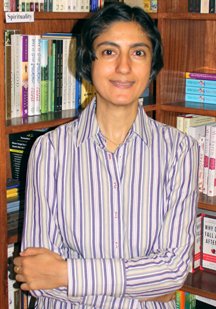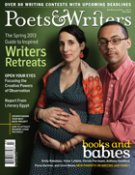We went because we believe in freedom of speech,” says Karam Youssef in her office at the back of Kotob Khan, her bookshop in al-Maadi, a leafy suburb eight miles south of Cairo along the Nile River. “It was the best day in my life, to be honest.” With her slight frame, black pixie haircut, button-down cotton shirt, and khaki pants, Youssef doesn’t look like a street fighter, but in the spring of 2011, the bookseller spent several weeks battling government supporters in Tahrir Square. “My husband [Ahmed Abou Zeid, an independent filmmaker] was injured when a rubber bullet struck him above the eye.”

Youssef joined thousands of protesters in Tahrir Square with hope that President Hosni Mubarak’s ouster would lead to greater freedom of expression, but now she’s worried that the Arab Spring of 2011—known in Egypt as the January 25th Revolution—will result in increased censorship and repression. Shortly after her husband was injured, Youssef noted that the protests were beginning to be dominated by men with a religious agenda, and she abandoned the square. “Egyptians as a society, they are moderate; they aren’t fanatics,” she says. “But now it seems like maybe there is more fanaticism. This current is strong, and we didn’t know about it.”
Youssef’s father died when she was young, and her mother, widowed at age twenty-eight, was an elementary school teacher who encouraged her daughter to read and taught her to be independent—but not too independent. When Youssef earned academic scholarships to universities in the United Kingdom, her mother balked, and Youssef settled for a school in Cairo. After college, she dreamed of making documentaries for TV and radio, but lacked the resources and connections for the mandatory internship and took a job with AT&T (which became Lucent, then Alcatel-Lucent). In twelve years she worked her way up from administrative assistant to manager before switching to Hewlett-Packard. By 2006, she had saved enough to start something of her own (“something to do with culture and books,” she says) and she opened a bookstore and started a publishing house.
At Kotob Khan, floor-to-ceiling wooden shelves lined with books fill two back rooms and surround a front café area; posters and black-and-white photos of famous authors hang in the spaces between the shelves. In addition to offering a selection of classic and contemporary authors in English—from Gore Vidal to Knut Hamsun--and two rooms of Arabic titles, Youssef screens films here, hosts writing workshops, and sponsors concerts. Her publishing arm focuses on printing works of local poetry and literary fiction and translating into Arabic foreign works she admires. “We were happy for three to four years,” she says, “then I started to find out about my society and how corrupt it is.”
Former dictator Mubarak is widely credited with relaxing censorship laws, but corruption and religious extremism undermined these advances. In 2010, an official visited Youssef’s store looking for bribes. In the past, they had given him what he asked for, but this time she said, “Enough,” and rebuffed him. A short time later, she received an unexpected call from her printer, who was in the midst of preparing an Arabic edition of Shadows of the Pomegranate Tree by the Anglo-Pakistani author Tariq Ali. (The book, the first in a series of five, is about the fall of Moorish southern Spain in 1492 to the Christian forces of Ferdinand and Isabella.) “I’m sorry, I cannot print this for you,” she recalls being told. A scene depicting young men bathing together in a hammam, a public bath, while reading poetry might get him into trouble, he said.
“The evening of the same day, January 17, 2011,” Youssef says, “a guy came into the bookstore and said, ‘Your bookmark is haram [sinful].’ It has Islamic calligraphy and English script, and I’ve got a fatwa [a ruling on a point of Islamic law] from al-Azhar [Cairo’s eleven-hundred-year-old religious university] that it is haram.”
Eleven days later, on January 28, she and her husband joined the protesters in the square.
Since the revolution, business has plummeted; English book sales to tourists and expatriate customers that subsidized her other activities have fallen by 60 percent. “The margin of Arabic books is very limited,” she says during our interview, which took place last August. “Embassies are telling people not to come. They kidnap tourists—Americans—in the Sinai all the time. There’s no police. It’s a big mess.”
During the early days of the revolution, Youssef noticed an increase in sales of writing about revolutions and change. People bought books about Che Guevera, Communism, the Arab-Israeli conflict, and the U.S. Constitution, about “the state of law and what it means when you say somebody is liberal.” But those sales have faded. “The country is exhausted now,” Youssef says. “We went out for freedom and justice, and we got the Muslim Brothers running the country. And to them, we are the enemy. And I may be the first thing they turn against.”
![]()
After our meeting, I return to my pension in Cairo’s historic downtown. The roundabouts and avenues here are lined with beautiful but crumbling Haussmann-style buildings built during the nineteenth-century reign of Isma’il Pasha. Naguib Mahfouz and Alaa al-Aswany, two of Egypt’s most famous authors, have written tales about this neighborhood, and as I walk its streets, I remember the pages of their novels. At 34 Talaat Harb Street, I pause to admire the Greek Revival bust above a door tucked into a neoclassical lintel nearly hidden under signs announcing travel agencies, trading companies, doctors, and professionals; this building, with its sixth-floor row of Roman columns, balconies with iron railings, open interior stairs and nonfunctioning wooden elevator with brass fittings, is the setting of al-Aswany’s The Yacoubian Building (American University in Cairo Press, 2005), a novel about contemporary Egyptians—about once-prosperous Europhiles, immoral millionaires, devout doormen, and a host of other characters.
Continuing east, I pass the palatial neo-Mamluk building that houses the Museum of Islamic Art and cross the street into the narrow alleys of Islamic Cairo.








